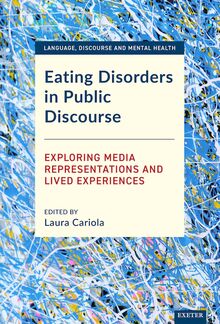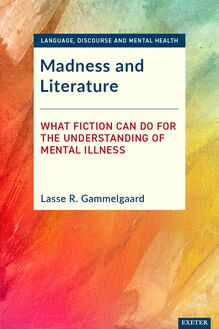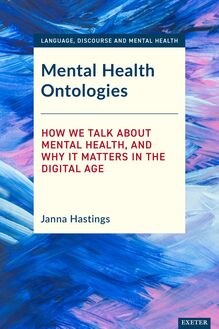-
 Univers
Univers
-
 Ebooks
Ebooks
-
 Livres audio
Livres audio
-
 Presse
Presse
-
 Podcasts
Podcasts
-
 BD
BD
-
 Documents
Documents
-
- Cours
- Révisions
- Ressources pédagogiques
- Sciences de l’éducation
- Manuels scolaires
- Langues
- Travaux de classe
- Annales de BEP
- Etudes supérieures
- Maternelle et primaire
- Fiches de lecture
- Orientation scolaire
- Méthodologie
- Corrigés de devoir
- Annales d’examens et concours
- Annales du bac
- Annales du brevet
- Rapports de stage
La lecture à portée de main
Vous pourrez modifier la taille du texte de cet ouvrage
Découvre YouScribe en t'inscrivant gratuitement
Je m'inscrisDécouvre YouScribe en t'inscrivant gratuitement
Je m'inscrisEn savoir plus
Vous pourrez modifier la taille du texte de cet ouvrage
En savoir plus

Description
Mental health presents one of the defining public health challenges of our time. Proponents of different conceptions of what mental illness is wage war for the hearts and minds of patients, practitioners, policy-makers, and the public. Debate and fragmentation around the nature of the entities that feature in the mental health domain divide resources and reduce progress. The way mental health is publicly discussed in the media has tangible effects, in terms of stigma, access to healthcare and resources, and private expectations of recovery.
This book explores in detail the sorts of statements that are made about mental health in the media and public reporting of scientific research, grounding them in the wider context of the theoretical frameworks, assumptions and metaphors that they draw from. The author shows how a holistic understanding of the way that different aspects of mental illness are interrelated can be developed from evidence-based interpretation of the latest research findings. She offers some ideas about corrective, integrative approaches to discussing mental health-related matters publicly that may reduce the opposition between conceptualisations while still aiming to reduce stigma, shame and blame. In particular, she emphasises that discourse in the media needs to be anchored to an overview of all the research results across the field and argues that this could be achieved using new technological infrastructures.
The author provides an integrative account of what mental health is, together with an improved understanding of the factors driving the persistence of oppositional accounts in the public discourse. The book will be of benefit to researchers, practitioners and students in the domain of mental health.
Preface
Introduction
How Do We Talk About Mental Health?
What Do We Mean When We Say ‘Biological’?
Health and Disease in the Domain of the Mental
How Should We Talk About Mental Health?
How to Talk More About Mental Health
Ontology as an Antidote to Data Disintegration
Conclusion
Notes
References
Index
Sujets
Informations
| Publié par | University of Exeter Press |
| Date de parution | 01 juillet 2020 |
| Nombre de lectures | 1 |
| EAN13 | 9781905816514 |
| Langue | English |
Informations légales : prix de location à la page 0,5000€. Cette information est donnée uniquement à titre indicatif conformément à la législation en vigueur.
Extrait
LANGUAGE, DISCOURSE AND MENTAL HEALTH
Mental Health Ontologies
LANGUAGE, DISCOURSE AND MENTAL HEALTH
Series Editors , Laura Cariola , Lecturer in Applied Psychology, University of Edinburgh, UK Billy Lee , Lecturer in Psychology, University of Edinburgh, UK Lisa Mikesell , Associate Professor of Communication, Rutgers University, USA Michael Birch , Professor of English and Communications, Massachusetts College of Liberal Arts, USA
Mental Health Ontologies: How We Talk About Mental Health, and Why it Matters in the Digital Age , Janna Hastings, 2020
Madness and Literature: What Fiction Can Do for the Understanding of Mental Illness , Lasse R. Gammelgaard, 2020
MENTAL HEALTH ONTOLOGIES
How We Talk About Mental Health, and Why it Matters in the Digital Age
Janna Hastings
First published in 2020 by University of Exeter Press Reed Hall, Streatham Drive Exeter EX4 4QR UK www.exeterpress.co.uk
© Janna Hastings 2020
The right of Janna Hastings to be identified as author of this work has been asserted by her in accordance with the Copyright, Designs and Patents Acts 1988.
British Library Cataloguing in Publication Data A catalogue record for this book is available from the British Library.
ISBN 978-1-905816-50-7 (Hardback) ISBN 978-1-905816-57-6 (Paperback) ISBN 978-1-905816-51-4 (ePub) ISBN 978-1905816-52-1 (PDF)
Typeset in Caslon and Myriad by BBR Design, Sheffield
Contents
Preface
1. Introduction
2. How Do We Talk About Mental Health?
3. What Do We Mean When We Say ‘Biological’?
4. Health and Disease in the Domain of the Mental
5. How Should We Talk About Mental Health?
6. How to Talk More About Mental Health
7. Ontology as an Antidote to Data Disintegration
8. Conclusion
Notes
References
Index
Preface
I am enormously grateful to the editors of the book series ‘Language, Discourse and Mental Health’, both for creating a space for dialogue on this very important subject, and for giving me a chance to contribute. Thanks also to Hetty Marx at the University of Exeter Press for her invaluable support through every part of the process of preparing this manuscript.
This work arises, as is commonly the case, from many different convergent influences over the years, and it would be impossible to acknowledge them all. I have been working with informatics approaches applied to data management—ontologies—in biology since 2007. Since 2010 I have also been applying these approaches to the social and behavioural sciences, initiated during a research assistantship on emotions and other mental phenomena hosted by the fantastically interdisciplinary Swiss Centre of Affective Sciences in Geneva. While in Geneva, I benefited from helpful discussions with Kevin Mulligan, David Sander, Olivier Massin, Julien Deonna, Cristina Soriano and many others. It was during my time in Geneva that I first appreciated the nature and scope of ontological debates in the social and behavioural sciences, which are in some senses more far-reaching and stubborn than the equivalent debates in the natural sciences. Although I met many social and behavioural researchers who were of the view that an integrative ontology will never be achievable, I also met several who were actively trying to work towards much-needed integration, one step at a time. More recently, I have been enormously inspired by the work of Robert West and Susan Michie at University College London, who are each tackling in practical, concrete ways the huge challenges associated with making all of the research in their respective interdisciplinary domains comparable, discoverable and integrated in order to facilitate progress, using ontologies as part of the wider computational infrastructure to make that ambitious goal happen.
I have also benefited enormously from years of conversations on various topics related to the ontology of mental phenomena with collaborators and members of the wider ontology community including, but not limited to, Rasmus Rosenberg Larsen, Stefan Schulz, Werner Ceusters, Neil Otte, Nicolas le Novère, Jeanette Chacón, Mark Jensen and, most of all, Barry Smith. Smith’s paradigm of applied ontology as a scientific tool, and his practical methodology of realism-based ontology development, have profoundly influenced my work for more than a decade since I first encountered these ideas. Although he is fond of saying that when he became an ontologist he ceased to be a philosopher, in my opinion Smith’s work continues to exemplify the best in philosophy, by offering a philosophy that stubbornly refuses to be insular but rather applies itself directly to real-world problems, and accepts the practical constraints that arise when trying to create solutions that genuinely have the power to change the world. It is a philosophy that cuts across all the traditional divisions between the domains of the humanities, the sciences and engineering, and thereby exemplifies the continued relevance of philosophy for the world we live in today.
I would like to thank my sister, Tamsin Hastings, who has been a sounding board for many of the ideas presented in this text over the last few years. I am lucky to share with her many of my interests which lie at the stubborn frontier between the personal and the societal. I am deeply grateful to my husband Sven Bergmann for all the many diverse ways in which he supports my creative and professional outputs.
I would also like to particularly thank Rasmus Rosenberg Larsen for very helpful feedback on an earlier version of this text. Some of the ideas contained in this text have further benefited from presentation and audience discussions at workshops and conferences including the International Conference on Biomedical Ontology (ICBO) in 2011 and 2012, the American Association for Philosophy of Psychiatry (AAPP) annual meeting in 2018, and the Ontologies for Precision Health workshop in February 2019.
Needless to say, all errors in the text are despite these positive influences, and are my responsibility alone.
Mental health has a societal impact, but also a deeply personal impact on many, many individuals and families, including mine. I lost my father to a serious psychotic illness when I was a young child. As he progressively became more and more absorbed into a world that didn’t exist, he was lost to all those who had loved him. Ultimately, he was to remain so until his death. As with many families touched by such a condition, an inability to talk about what had happened, a lack of a shared way to understand and frame our experiences, complicated our individual and collective loss, grief and recovery.
This book is dedicated to my family and all families that are touched by the ravages of mental illness across the world. It is a book written for those among us who are survivors—and dedicated in memory to those who were lost too soon.
1 Introduction
Mental health presents one of the defining public health challenges of our time. When taken together, the conditions affecting mental health—depression, anxiety and schizophrenia, to name but a few—comprise one of the leading causes of disability and suffering across developed and developing nations alike. Prevalence of many of these conditions is growing. At the same time, our understanding of the causes of poor mental health has advanced only slowly, and there have been few significant advances in treatment during the last few years (Chandler, 2013).
A 2018 Lancet Commission report into the scale and costs associated with mental health conditions across the world hailed the problem as ‘monumental’ and predicted that the rising costs would approach US$20 trillion by 2030 if not addressed (Patel et al. , 2018). This state of affairs can be described as an emergency, and there is widespread recognition among policymakers, funders and other stakeholders that business as usual is not working. A radical shift in our collective approach is clearly needed. But what is it that needs to shift?
The answer one finds to this question will depend on who one asks. Like most complex subject matters, questions relating to mental health are not within the purview of just one scientific discipline. A plurality of perspectives and approaches exist, broadly organised into communities of research and practice, such as psychology, psychiatry, biology, sociology and so on, each with their own subdivisions into specialities and subdisciplines, with their own tools and methodologies. The strength of this multitude of different approaches is that when taken together, they cover the range of different possible angles for investigation into each phenomenon, complementing each other. Multiple lines of evidence can provide solidity and robustness to scientific discoveries. 1 But different communities of practice, each with their own theories, methods and assumptions, can also at times struggle to understand one another, speak different languages, and disagree in deep and fundamental ways.
This is the case in mental health. The way we think about, talk about and understand what the conditions affecting mental health are, is regularly and heatedly contested. This includes disagreement about the very nature of the entities involved, as well as the ways that these entities are interrelated and how they should best be investigated. Our foundation for even beginning to ask the right questions about mental health is fragmented.
Greater and greater specialisation is required to master the techniques by which we gain access to genuinely novel discoveries that push forward what we as a collective know, the scientific ‘lenses’ that allow us to focus in on, manipulate and thereby learn more about the world and all the entities within it. For some types of entity, such as the subatomic particles that constitute physical matter, only one or a small number of such disciplinary lenses give access to the nature of the entities involved. But this is not the case for the subject matter of mental heal
-
 Univers
Univers
-
 Ebooks
Ebooks
-
 Livres audio
Livres audio
-
 Presse
Presse
-
 Podcasts
Podcasts
-
 BD
BD
-
 Documents
Documents
-
Jeunesse
-
Littérature
-
Ressources professionnelles
-
Santé et bien-être
-
Savoirs
-
Education
-
Loisirs et hobbies
-
Art, musique et cinéma
-
Actualité et débat de société
-
Jeunesse
-
Littérature
-
Ressources professionnelles
-
Santé et bien-être
-
Savoirs
-
Education
-
Loisirs et hobbies
-
Art, musique et cinéma
-
Actualité et débat de société
-
Actualités
-
Lifestyle
-
Presse jeunesse
-
Presse professionnelle
-
Pratique
-
Presse sportive
-
Presse internationale
-
Culture & Médias
-
Action et Aventures
-
Science-fiction et Fantasy
-
Société
-
Jeunesse
-
Littérature
-
Ressources professionnelles
-
Santé et bien-être
-
Savoirs
-
Education
-
Loisirs et hobbies
-
Art, musique et cinéma
-
Actualité et débat de société
- Cours
- Révisions
- Ressources pédagogiques
- Sciences de l’éducation
- Manuels scolaires
- Langues
- Travaux de classe
- Annales de BEP
- Etudes supérieures
- Maternelle et primaire
- Fiches de lecture
- Orientation scolaire
- Méthodologie
- Corrigés de devoir
- Annales d’examens et concours
- Annales du bac
- Annales du brevet
- Rapports de stage








